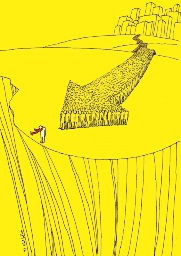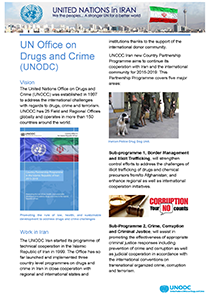UNODC Iran calls for more effort on overcoming the stigma and discrimination against People who are living with HIV/AIDS
 "I learnt that I was HIV positive after my husband was hospitalized for a gastrointestinal disease" said Parisa, a 40 year old Iranian woman living with HIV since 12 years. "At the time, I did not even know what HIV meant". A couple of years later, Parisa's husband passed away due to AIDS related complications, leaving her with a son who was also HIV infected.
"I learnt that I was HIV positive after my husband was hospitalized for a gastrointestinal disease" said Parisa, a 40 year old Iranian woman living with HIV since 12 years. "At the time, I did not even know what HIV meant". A couple of years later, Parisa's husband passed away due to AIDS related complications, leaving her with a son who was also HIV infected.
Parisa said she was cut off from her husband's family after she was diagnosed and she faced lots of discrimination even from hospitals' staff. But the worst came after she revealed her son's status to his school teachers. "As soon as he learned of my son's HIV status, the responsible of the school asked to meet me. He accused me of putting other children at risk of infection by sending my son to school, insinuating he had to stay at home". It was only thanks to the intervention of the counselor at one of the Voluntary Counseling and Testing (VCT) centers that Parisa's son was allowed to continue attending classes. However, he had to sit on a bench segregated from the other children. "My son couldn't bear it for long. Two years ago, he left school".
Stigma against people infected is often due to lingering myths about how HIV is spread. Some people still believe the virus can be transmitted via physical contact, saliva, dishes or toilet seats. Parisa understood that these misconceptions were behind the discrimination she and her son faced. In order to contribute to increasing knowledge in the society on HIV/AIDS, she decided to volunteer with one of the local Non-Governmental Organizations (NGOs) active in HIV prevention. Five years later, Parisa became a counselor at a Positive Club, a special center for HIV positive people that offers a wide range of services including counseling, education, vocational training and group therapy. "Now, I finally enjoy disclosing my condition. When I tell the patients I meet that I am also HIV positive, I feel their relief: suddenly, they are no longer alone".
Stigma against people who are living with HIV represents an important barrier in controlling the epidemics of HIV. Early treatment of HIV infections is one of the best ways to slow the spread of the virus, but the stigma that still surrounds the disease leads people to delay HIV testing, put off needed care or not reveal their infection status to others and especially medical providers. In the Declaration of Commitment on HIV/AIDS (2001) and the Political Declaration on HIV/AIDS (2006), governments were committed to reduce stigma and discrimination and to create a legal and social environment safe for voluntary disclosure of HIV status.
In the Islamic Republic of Iran, UNODC has been supporting national efforts to fight stigma and discrimination. In the framework of its country programme for 2011-2014, UNODC has envisaged a series of activities in the area of HIV/AIDS including the production of community awareness materials and the development of programmes for HIV/AIDS stigma and discrimination. In September and October 2012, UNODC organized in collaboration with the Drug Control Headquarters, Simay-e-Sabz-e-Rahaee NGO, and UNAIDS, a caricature exhibition with the aim to sensitize the artistic community and the general public on the negative effects of stigma and discrimination on people who are living with HIV. The exhibition was held in Tehran, first in the Artists' House Gallery from 13 to 20 September, then in the Arasbaran Cultural Center from 16 to 25 of October.
"The Islamic Republic of Iran has been successful in implementing Drug treatment and HIV prevention programmes including the Methadone Maintenance Treatment. But much work still needs to be done to tackle stigma in the society", mentioned Mr. Antonino De Leo, UNODC Representative during the closing ceremony of the exhibition.
The ceremony was concluded by the distribution of awards and appreciation letters to the creators of the 5 best caricatures. Mr. Ahmadi, a caricaturist from Shiraz who won the first price said "Before this competition, I did not know anything about HIV and stigma. After I studied about it, I came to realize that the effect of stigma on the society can be way more devastating than the illness itself." Mr. Ahmadi's work of art shows an HIV infected person standing on the edge of a cliff and an arrow formed by a large number of individuals directed towards him. "Sometimes, the society can push you over the top".
"I hope that small steps such as this exhibition will help decrease stigma and discrimination against people who are living with HIV in the Islamic Republic of Iran. The bottom line is to avert HIV infections and related deaths and to improve the quality of life of people living with HIV", said Mr. De Leo.



